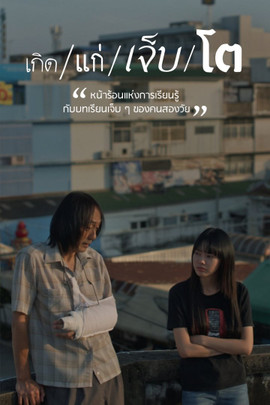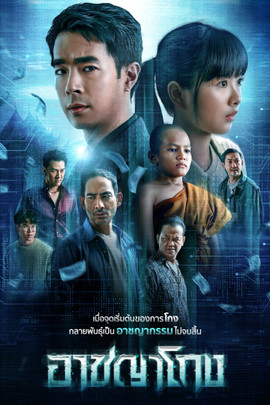
นมัสเต ชาวไทยเชื้อสายเนปาล
เมื่อไทยและเนปาลเป็นเมืองพุทธเหมือนกัน และทั้งสองยังได้รับอิทธิพลของศาสนาพราหมณ์-ฮินดูคล้ายกัน จึงทำให้เกิดประเพณีและวัฒนธรรมที่คล้ายคลึง รวมถึงความสัมพันธ์ของผู้คนที่เชื่อมโยงถึงกัน
“ธันวา” ชายหนุ่มชาวเนปาล ได้มายังชุมชนแห่งหนึ่งใจกลางกรุงเทพฯ ย่านซอยสุขุมวิท 81 เพื่อมาพบกับกลุ่มชาวเนปาลที่มีบรรพบุรุษอยู่ในเมียนมาอพยพเข้าไทยมาเป็นแรงงานทำเหมืองแร่ที่ อ.ทองผาภูมิ จ.กาญจนบุรี และอยู่มานานจนได้รับสัญชาติไทยแล้ว และภายในชุมชนนี้มี “ตรีนาถเทวาลัย” (Trinath Devalaya) ศาสนสถานแห่งเดียวในกรุงเทพฯ ที่เกิดจากแรงศรัทธาของพี่น้องชาวเนปาลที่ร่วมลงขันก่อสร้างขึ้นในปี ค.ศ. 1993 ถึงแม้ว่าวัดแห่งนี้จะมีพิธีกรรมไม่เข้มข้นเทียบเท่าแผ่นดินแม่ แต่ก็ได้รักษาศรัทธาของชาวเนปาลไม่ให้จางหาย และยังถ่ายทอดวัฒนธรรมต่าง ๆ แก่คนรุ่นใหม่ให้สืบทอดเรื่องราวของชาติพันธุ์สืบไป
ติดตามเรื่องราวของพวกเขาได้ใน Spirit of Asia ซีรีส์ชุดวิถีความสุขใต้ฟ้าเมืองไทย ตอน นมัสเต ชาวไทยเชื้อสายเนปาล วันอาทิตย์ที่ 12 ก.ค. 63 เวลา 16.30 น. ทางไทยพีบีเอส รับชมออนไลน์ทาง www.thaipbs.or.th/Live และสามารถรับชมภาคภาษาอังกฤษได้ทาง www.youtube.com/ThaiPBS
NAMASTE: THAI CITIZENS OF NEPALESE ORIGIN
Thailand and Nepal are both Buddhist countries that have been on the receiving end of Hindu influences. As a result, there are similarities in culture and tradition which include the historic relationships between groups of people.
Dhanwa, a Nepalese gentleman who is a local resident, arrives at an old community in Sukhumvit Soi 81 in Bangkok. The ancestors of the community members were Nepalese people who had settled in Myanmar to make their livelihoods. Those ancestors then migrated to Thailand to work as labourers in the mines of Thong Pa Poom District in Kanchanaburi Province. The descendants remained in this country and obtained Thai citizenship. Trinath Devalaya is the only religious site in Bangkok that was built from the power of faith of the Thai citizens of Nepalese ancestry who helped to fund the construction. The site was built in 1993. The rituals here are not as elaborate as those practiced in the motherland. But the faith of the Nepalese community has not faded, and their cultural identity has been inherited by the younger generation.
Spirit of Asia

เมนตาไว วิถีคนป่าความงามที่ไม่สมมาตร
15 มี.ค. 63
เรื่องเล่าวิถีคนเหนือเขื่อนไซยะบุรี
22 มี.ค. 63
สายน้ำโขงที่ไม่ย้อนกลับ
29 มี.ค. 63
แดนสวรรค์สี่พันดอน
5 เม.ย. 63
สตึงแตรงบนลุ่มน้ำโขง
12 เม.ย. 63
ลมหายใจของโตนเลสาบ
19 เม.ย. 63
เรื่องเล่าจากโรงเรียนไม้ไผ่
26 เม.ย. 63
ก้าวที่สองของโรงเรียนไม้ไผ่
3 พ.ค. 63
วงศ์วานอิสราเอลที่สูญหาย
10 พ.ค. 63
สังคมยิวสมัยใหม่ นอกดินแดนพันธสัญญา
17 พ.ค. 63
จากแดนจิงโจ้ถึงช้างกรุงเก่า
24 พ.ค. 63
โลกรอบตัวของช้างไทย
31 พ.ค. 63
พ่อใหญ่มาร์ตินแห่งบ้านคำปลาหลาย
7 มิ.ย. 63
ฟาร์มสุขของ ดร.ฌอง ฟิลลิป บาบู
14 มิ.ย. 63
ค่ายมวยสร้างคนของมะลิ วัฒนะยา
21 มิ.ย. 63
ฟังเสียงเด็กผ่านความคิด อิลยา สมิร์นอฟ
28 มิ.ย. 63
อวาเล สกุลช่างปั้นดินแห่งหิมาลัย
5 ก.ค. 63
นมัสเต ชาวไทยเชื้อสายเนปาล
12 ก.ค. 63
ทายาทแดนหิมาลัยใต้ฟ้าเมืองไทย
19 ก.ค. 63
นักสู้รุ่นเล็กในป่าใหญ่
26 ก.ค. 63
เราทุกคนต่างมีแสงสว่างในตัวเอง
2 ส.ค. 63
นักบุญแห่งเผ่าตองเหลือง
9 ส.ค. 63
นักบุญผู้พัฒนาชุมชน
16 ส.ค. 63
กาแฟข้นชีวิตเข้มบนดอยมณีพฤกษ์
23 ส.ค. 63
อาเนาะกายู รากที่ไม่ลืมดิน
30 ส.ค. 63
ก้าวต่อไปของลวดลายมลายู
6 ก.ย. 63
มังงะมลายู รู้จักวิถีมลายูผ่านการ์ตูน
13 ก.ย. 63
ถอดรหัสกริชรามันห์
20 ก.ย. 63
ชุมชนเจริญไชย บันทึกการค้าฝ่าวิกฤต
27 ก.ย. 63
วัฒนธรรมนำเที่ยวในย่านตลาดน้อย
4 ต.ค. 63
Spirit of Asia

เมนตาไว วิถีคนป่าความงามที่ไม่สมมาตร
15 มี.ค. 63
เรื่องเล่าวิถีคนเหนือเขื่อนไซยะบุรี
22 มี.ค. 63
สายน้ำโขงที่ไม่ย้อนกลับ
29 มี.ค. 63
แดนสวรรค์สี่พันดอน
5 เม.ย. 63
สตึงแตรงบนลุ่มน้ำโขง
12 เม.ย. 63
ลมหายใจของโตนเลสาบ
19 เม.ย. 63
เรื่องเล่าจากโรงเรียนไม้ไผ่
26 เม.ย. 63
ก้าวที่สองของโรงเรียนไม้ไผ่
3 พ.ค. 63
วงศ์วานอิสราเอลที่สูญหาย
10 พ.ค. 63
สังคมยิวสมัยใหม่ นอกดินแดนพันธสัญญา
17 พ.ค. 63
จากแดนจิงโจ้ถึงช้างกรุงเก่า
24 พ.ค. 63
โลกรอบตัวของช้างไทย
31 พ.ค. 63
พ่อใหญ่มาร์ตินแห่งบ้านคำปลาหลาย
7 มิ.ย. 63
ฟาร์มสุขของ ดร.ฌอง ฟิลลิป บาบู
14 มิ.ย. 63
ค่ายมวยสร้างคนของมะลิ วัฒนะยา
21 มิ.ย. 63
ฟังเสียงเด็กผ่านความคิด อิลยา สมิร์นอฟ
28 มิ.ย. 63
อวาเล สกุลช่างปั้นดินแห่งหิมาลัย
5 ก.ค. 63
นมัสเต ชาวไทยเชื้อสายเนปาล
12 ก.ค. 63
ทายาทแดนหิมาลัยใต้ฟ้าเมืองไทย
19 ก.ค. 63
นักสู้รุ่นเล็กในป่าใหญ่
26 ก.ค. 63
เราทุกคนต่างมีแสงสว่างในตัวเอง
2 ส.ค. 63
นักบุญแห่งเผ่าตองเหลือง
9 ส.ค. 63
นักบุญผู้พัฒนาชุมชน
16 ส.ค. 63
กาแฟข้นชีวิตเข้มบนดอยมณีพฤกษ์
23 ส.ค. 63
อาเนาะกายู รากที่ไม่ลืมดิน
30 ส.ค. 63
ก้าวต่อไปของลวดลายมลายู
6 ก.ย. 63
มังงะมลายู รู้จักวิถีมลายูผ่านการ์ตูน
13 ก.ย. 63
ถอดรหัสกริชรามันห์
20 ก.ย. 63
ชุมชนเจริญไชย บันทึกการค้าฝ่าวิกฤต
27 ก.ย. 63
วัฒนธรรมนำเที่ยวในย่านตลาดน้อย
4 ต.ค. 63





















